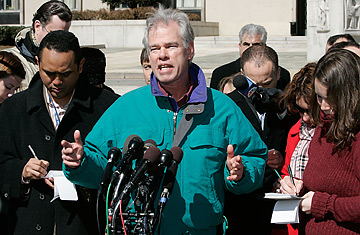
Denis Collins (center), a juror in the I. Lewis "Scooter" Libby trial, speaks to the media outside the federal courthouse March 6, 2007, in Washington, D.C.
During the investigation into the leak of Plame's identity, Libby told the grand jury he heard about Plame being a CIA officer from NBC's Tim Russert. Libby testified that he recalled being "surprised" at the news during his conversation with Russert. The jury, looking at their compilation of facts posted on the wall, were convinced Libby already knew about Plame at that point. Denis Collins, 57, a novelist and former journalist who served on the jury, said this discrepancy persuaded them that Libby had perjured himself.
Collins described the deliberations of the 11-person jury (one was removed for getting information about the case from outside the court) as painstakingly deliberate. A couple of the jurors were natural managers who set about to organize the information from the trial in a methodical way, said Collins. During the moments when their minds were off the case in the jury room on the sixth floor of the federal courthouse in Washington, D.C., he said, the jurors were lusting after the half-smoke sausages sold by the hotdog vendor in the courtyard below.
Some of the jurors, said Collins, were frustrated that they were being asked to pass judgment on someone who often seemed merely a pawn in a larger game. "What are we doing with this guy here?" said Collins, expressing the sentiment of some of his fellow jurors during the deliberations. "Where's Rove? Where's Cheney? It seems like he was the fall guy." Overall, said Collins, the jury was sympathetic to Libby. He was sitting in front of them in court every day; his voice was "polite and nice" in the grand jury tapes. But early on in their deliberations, recalled Collins, one juror told the others a maxim her mother always repeated: "When you let yourself be led by emotion, it usually leads you the wrong way." This, said Collins, characterized the approach the jury took.
Speaking in front of a bank of microphones in an aqua blue windbreaker, Collins mused on how he would feel if, after he and the other jurors put so much thought in this verdict, it was all wiped away by a White House pardon. "If Bush pardons Libby, I wouldn't be upset a bit," he said, "I don't have any anger or spite about Mr. Libby. I just don't think that way."
